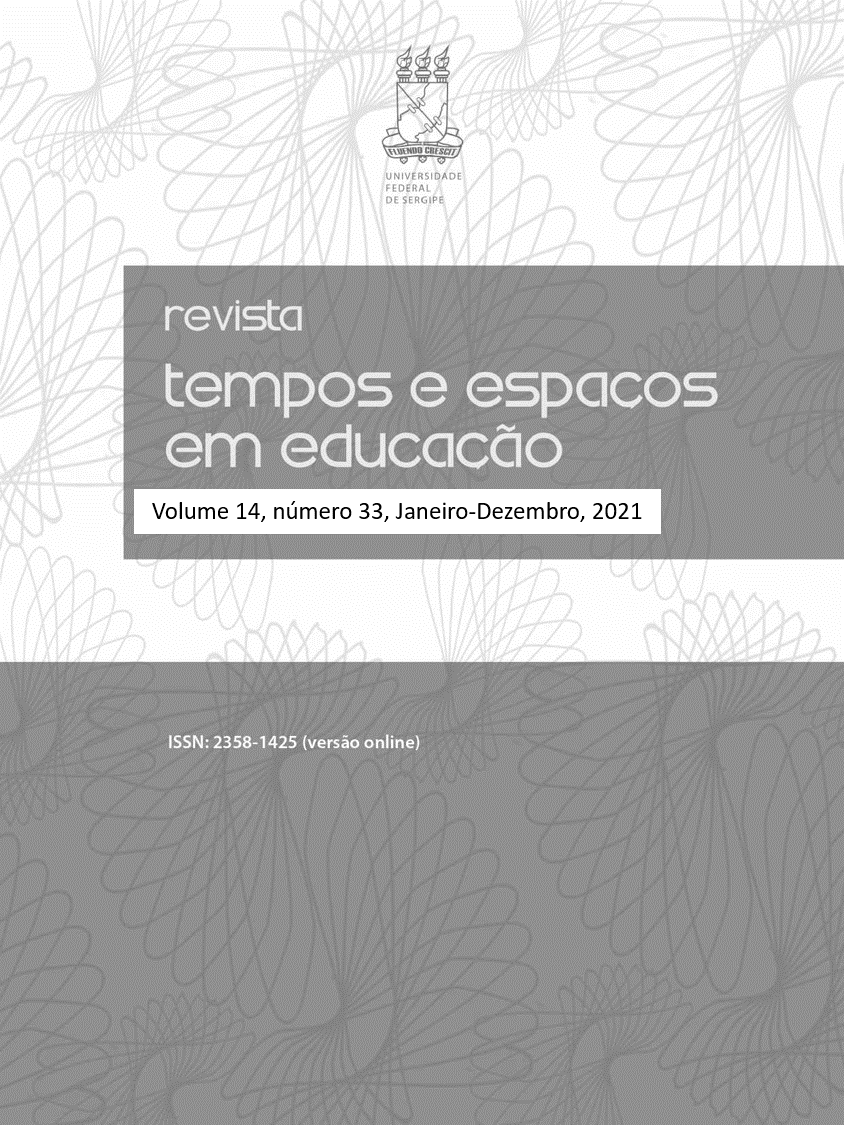Gestão de projeto coletivos como fator de desenvolvimento da equipe escolar
DOI:
https://doi.org/10.20952/revtee.v14i33.15619Palavras-chave:
Coletividade, Gestão de projetos coletivos, Desenvolvimento do pessoal da escola, Parceria social, Desenvolvimento da individualidadeResumo
O artigo trata da organização das atividades do projeto coletivo na escola. Os projetos líderes, descritos no artigo, enquadram-se no programa de desenvolvimento do trabalho extracurricular. Enfatizamos a importância da parceria social, interação com sindicatos criativos da cidade, associações públicas, sociedades desportivas, etc. Um novo modelo eficaz de interação entre os sujeitos da atividade educacional é proposto no âmbito da implementação de projetos de longo prazo de orientação social, contendo potencial educacional, cultural e de desenvolvimento. Como efeito adicional, notamos o desenvolvimento das habilidades de liderança dos participantes nas relações educacionais.
Downloads
Referências
Bukvić Ivana Bestvina, Buljubašić Iva, & Ivić Marija. (2020). Project management education in Croatia: A focus on the IT sector needs. Journal of Contemporary Management Issues, 1(25), 255-278.
Collings, E. (1926). Experience of the American school on the method of projects. Moscow: Novaya Moskva.
Dewey, J. (1994). Democracy and Education. N.Y.: Collier Macmillan Ltd.
Eckert, Jonathan (2018). Collective Leadership Development: Emerging Themes From Urban, Suburban, and Rural High Schools. Educational Administration Quarterly, 55 (3), 477-509.
Federal portal “Russian education”. ITT research Institute. Russian education. Retrieved from: http//www.edu.ru.
Frumin, I.D. (2015). Educational practice supporting adulthood. Educational policy, 4 (70).
Gagin, Y.A. & Dmitriev, S.V. (2000). Spiritual acmeism of biomechanics. Saint Petersburg: BPA.
Kabushkin, N. I. (2009). Fundamentals of management-textbook. Moscow: Novoe Znanie.
Kamenskiy, A.M. (2009). Intra-School educational cluster. National education, 9, 90-93.
Kamenskiy, A.M. (2018). School and society: preconditions, reality, tendency interactions. Educational and methodological guide. Saint Petersburg: LOIRO.
Kamenskiy, A.M. & Karyagin, S.N. (2019). Distributed management in the development of social partnership of basic education organizations with sports orientation. People and education, 3, 4-8.
Karanja, Erastus & Grant, M. Donna (2020). Evaluating Learner-Centeredness Course Pedagogy in Project Management Syllabi Using a Content Analysis Approach. Journal of Information Systems Education, 2(31), 131-146. Retrieved from: https://aisel.aisnet.org/jise/vol31/iss2/6
Kilpatrick, W. (1921). Dangers and Difficulties of the Project Method and How to Overcome Them: Introductory Statement and Definition of Terms. Teachers College Record, Volume 22, Number 4.
Komarovsky, B.B. (1967). Russian pedagogical terminology. Moscow: Prosveshchenie.
Krupskaya, N.K. (1962). Pedagogical essays: in 11 volumes. Vol. 10, Moscow.
Lo, R., & Brown, R. (2000). National Library of Medicine. Collegian. Royal College of Nursing (Australia), 4 (7), 8-10, 12-3.
Makopoulou, Kyriaki & Armour, Kathleen (2013). Possibilities and challenges in teachers’ collegial learning. Educational Review, 66(1), 75-95.
Miller, Robert James, Goddard, Roger D., Minjung Kim, Jacob, Robin, Goddard, Yvonne & Schroeder, Patricia (2016). Can Professional Development Improve School Leadership? Results From a Randomized Control Trial Assessing the Impact of McREL’s Balanced Leadership Program on Principals in Rural Michigan Schools. Educational Administration Quarterly, 52 (4), 531-566.
Nemov, R.S. (1994). Psychology. Book 1. Moscow: Prosveshchenie: Vlados.
Polat, E.S. (2010). Modern pedagogical and information technologies in the education system. Moscow: Academia.
Potashnik, M.M. (2011). Exclusive aspects of school management. Moscow: Pedagogical society of Russia.
Rainford Karen, J. (2014). Saint Mary’s University of Minnesota. ProQuest Dissertations Publishing.
Salleh Hairon, & Clive Dimmock. (2011). Singapore schools and professional learning communities: teacher professional development and school leadership in an Asian hierarchical system. Educational Review, 64 (4), 405-424.
Scribner, Jay Paredes, Sawyer, R. Keith, Watson, Sheldon T. & Myers, Vicki L. (2007). Teacher Teams and Distributed Leadership: A Study of Group Discourse and Collaboration. Educational Administration Quarterly, 43(1), 67-100.
Silva, L. R., Santos, A. R., & Santos, I. T. R. (2020). Public policies for education of/in the field and the school environment in a settlement of the MST: the intimate relationship with the pedagogical policy. Journal of Research and Knowledge Spreading, 1(1), e11737.
Shamova, T.I. (1992). Research approach in school management. Moscow: APPCITP.
Shatsky, S.T. (1980). Selected pedagogical works in two volumes. Moscow: Pedagogika.
Targeted News Service. (2020). Washington, D.C., 29 May 2020.
Ushakov, K.M. (2011). School Management: crisis in the period of reforms. Moscow: Sentiabr.
Wentzel, K.N. (1923). New ways of upbringing and education of children. 2nd Ed. Moscow: Zemlia I Fabrika.
Yee Fan Tang, Sylvia & Lin Choi, Pik (2009). Teachers’ professional lives and continuing professional development in changing times. Educational Review, 61(1), 1-18.
Yegorov, S.F. (2002). History of pedagogy in Russia. Moscow: Academia, pp. 372-379.
Downloads
Publicado
Como Citar
Edição
Seção
Licença
À Revista Tempos e Espaços em Educação ficam reservados os direitos autorais pertinentes a todos os artigos nela publicados. A Revista Tempos e Espaços em Educação utiliza a licença https://creativecommons.org/licenses/by/4.0/ (CC BY), que permite o compartilhamento do artigo com o reconhecimento da autoria.



